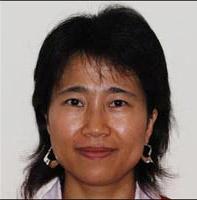Yan Dong, Ph.D.
Professor, Structural & Cellular Biology

Biography
Dr. Dong received her Ph.D. in experimental pathology from the State University of New York at Buffalo in 2000. From 2000 - 2002, she was a postdoctoral fellow in cancer chemoprevention at Roswell Park Cancer Institute. She became a research assistant professor in 2002 and an assistant professor in 2005 in the Cancer Chemoprevention Department. In November 2007, Dr. Dong joined the faculty of Tulane University School of Medicine as an assistant professor in the Department of Structural and Cellular Biology.
Research
Tulane Cancer Center Program Member
Dr. Dong has a long-standing interest in prostate cancer particularly in altered androgen receptor signaling in castration-resistant prostate cancer and mechanisms and efficacies of candidate prostate cancer interventions. Despite the recent development and FDA approval of new hormone therapy drugs for metastatic castration-resistant prostate cancer, disease progression after hormone therapies remains the most critical challenge in the clinical management of prostate cancer. Emerging evidences indicate that prostate cancers can adapt to all current hormone therapies by signaling through constitutively-active androgen receptor splice variants that lack the ligand-binding domain. We are currently characterizing how these splice variants are generated and their mechanisms of action. We are also developing drugs/regimens to inhibit these splice variants for more effective treatment of advanced prostate cancer.
Contributions
Click Here For PubMed Publications
Subing Cao, Tianfang Ma, Nathan Ungerleider, Claire Roberts, Margaret Kobelski, Lianjin Jin, Monica Concha, Xia Wang, Melody Baddoo, Ladan Fazli, Holly M Nguyen, Eva Corey, Elisa Ledet, Rubin Zhang, Jonathan L. Silberstein, Wensheng Zhang, Kun Zhang, Oliver Sartor, Xuesen Dong, Erik K. Flemington, and Yan Dong. (2019) Circular RNAs add diversity to androgen receptor isoform repertoire in castration-resistant prostate cancer. Oncogene, 38:7060-7072
Shanshan Bai, Subing Cao, Lianjin Jin, Margaret Kobelski, Blake Schouest, Xiaojie Wang, Nathan Ungerleider, Melody Baddoo, Wensheng Zhang, Eva Corey, Robert L. Vessella, Xuesen Dong, Kun Zhang, Xianghui Yu, Erik K. Flemington, and Yan Dong. (2019) A Positive Role of c-Myc in Regulating Androgen Receptor and its Splice Variants in Prostate Cancer. Oncogene, 38:4977–4989
Yang Zhan, Guanyi Zhang, Xiaojie Wang, Yanfeng Qi, Shanshan Bai, Dongying Li, Tianfang Ma, Oliver Sartor, Erik K. Flemington, Haitao Zhang, Peng Lee, and Yan Dong. (2017) Interplay between cytoplasmic and nuclear androgen receptor splice variants mediate castration resistance. Molecular Cancer Research, 15(1); 59-68.
Featured in the "Molecular Cancer Research Highlights: Selected Articles from This Issue" and in “Molecular Cancer Research Must-Read 2017”
Duo Xu, Yang Zhan, Yanfeng Qi, Bo Cao, Shanshan Bai, Wei Xu, Sanjiv S. Gambhir, Peng Lee, Oliver Sartor, Erik K. Flemington, Haitao Zhang, Chang-Deng Hu, and Yan Dong. (2015) Androgen receptor splice variants dimerize to transactivate target genes. Cancer Research, 75, 3663-3671. Cited by 112
Editorial: Emmanuel S. Antonarakis and Jun Luo. (2015) AR splice variant dimerization - clinical implications Nature Reviews Urology, 12, 431-433
B Cao, Y Qi, G Zhang, D Xu, Y Zhan, X Alvarez, Z Guo, X Fu, SR Plymate, O Sartor, H Zhang, and Y Dong. (2014) Androgen Receptor Splice Variants Activating the Full-Length Receptor in Mediating Resistance to Androgen-Directed Therapy. Oncotarget, 5, 1646-56. Cited by 134
